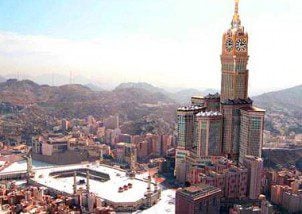The new tower on the skyline in Mecca, Saudi Arabia, looks incredibly like London’s Big Ben — and there’s a good reason.
A number of Muslims are calling for Greenwich Mean Time — the standard by which the world sets its clocks — be replaced by official Mecca time.

“This summer, the world’s largest clock began its first official duty: marking time during Ramadan in Mecca—Islam’s holiest city,” reports Salman Hameed writing for Religion Dispatches. “This colossal clock bears a striking resemblance to Big Ben, and the tower that hosts it is six times taller than the British landmark, making it the second tallest building in the world, visible for 16 miles.”
And as it began service, calls from Muslims came to for Mecca time to replace GMT — also called “Zulu” time by the military as well as astronauts in space. GMT has been the world standard for 125 years.
However, notes Hameed, some are claiming that GMT is an archaic holdover from colonial times — and it’s time to find a better standard. He continues:
Surely, there is nothing special about where the Greenwich Observatory is located. The reason that the meridian is zero at Greenwich is because the British figured out how to calculate longitude at sea first, so they got to make a part of England the main reference point. Names associated with science are often, if not always, symptomatic of political power of the time.
This is why many of the elements discovered in the 20th century—like berkelium, americium, and californium—have American names (though sometimes there were competing claims from Soviet laboratories also).
Similarly, because Arab astronomy was dominant in the late medieval period, and Arabic atlases played a key role in the development of modern astronomy, more than half of the brightest stars in the sky have Arabic names. But for some Muslims today, that’s not enough.
But what would justify Mecca to be the replacement reference point for the entire world?
“There is now a widespread belief amongst Muslims that one can prove ‘scientifically’ that Mecca is really the true ‘center of the world,'” writes Hameed. “This line of reasoning has been heavily promoted and popularized by a prominent Egyptian cleric, Sheikh Youssef al-Qaradawy, who claims that, unlike other longitudes, Mecca is in perfect alignment with the north magnetic pole.”
Hameed is an astronomer and assistant professor of Integrated Science & Humanities at Hampshire College in Massachusetts. Currently, he is studying the rise of Koran-based creationism in the Islamic world. As to the claims about Mecca, he writes:
Some Arab scientists have also lent their authority to these claims. For example, Abdel-Baset al-Sayeed of the Egyptian National Research Centre claims that Mecca is a “zero-magnetism zone.” In fact, he goes on to say, ‘That’s why if someone travels to Mecca or lives there, he lives longer, is healthier, and is less affected by the earth’s gravity. You get charged with energy.”
Such claims are open to debate, Hameed notes:
Mecca matters deeply to Muslims because of its religious importance. Building such an enormous clock may make it all the more a source of pride to the religion of over a billion people, though I can also imagine some objecting to the presence of such a large structure next to the holy grounds.
Nevertheless, the efforts by some to seek religious legitimacy of Mecca with bad science do a disservice to both religion and science, and perhaps diminish the dignity of the very place they seek to glorify.


